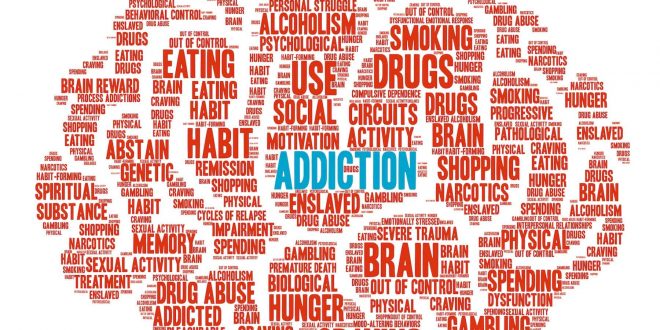Addiction can be a nasty thing to live with, and it may often negatively affect your physical and mental health. Becoming addicted to something is a taxing occurrence for many people, and it can be very hard to break the habits that keep you bound to your addiction.
While we often think of substance and chemical addictions, such as alcohol, drug, and tobacco addictions, there are many other types of addiction that individuals may experience. The symptoms and side effects of these non-chemical addictions are quite similar to those of chemical dependencies, but the onset of these dependencies differs.
Among the non-chemical addictions, people commonly become addicted to phones or computers, social media, foods, sex, video games, gambling, and shopping, among others. These non-chemical dependencies are often called behavioral addictions. You can learn more about these addictions here.
Behavioral addictions unfortunately tend to face a lot of stigmas, but they can be just as debilitating as addictions to chemical substances can be. They tend to evolve as the result of untreated mental illness, significant life events, or trauma.
Of course, any form of addiction has the potential to interfere with your work ethic, friendships, romantic relationships, and family relationships. And, sometimes, your addiction can even place you in harm’s way, both physically and financially.
Though they may appear to be less dangerous than others, behavioral addictions can still severely impact the livelihood of an individual and, if left unaddressed, contribute to other mental health concerns that may exacerbate the situation.
Symptoms Associated with Non-Chemical Addiction

As with people experiencing any addiction type, the non-chemically addicted person generally cannot stop themselves from or engaging in the activity to which they are addicted.
For instance, those who are addicted to gambling will often gamble away even essential funds (including money from their savings or children’s college funds, for instance) to continue participating in the activity.
There is a myriad of symptoms associated with non-chemical dependence; the following list encompasses some of the most commonly experienced symptoms, but these can vary depending on the behavior in question:
- Compulsive behavior or participation in an activity that cannot be controlled.
- Uncurbable participation in activities and undesirable behaviors.
- Uncontrollable behavioral tendencies.
- Judgment skills that are limited by addiction.
- Cravings of the substance or activity to which you are addicted.
- Lack of understanding of physical, financial, and emotional implications of your addiction, or an inability to prioritize these factors.
- Poor relationships with family, friends, and significant others as the result of the behavior(s).
The Onset and Treatment of Non-Chemical Addiction

Non-chemical addiction is a disorder associated with the activity of the brain. In other words, this type of addiction is a result of the way in which the brain is constructed and the ways its different pieces are connected.
While the reason for the inability of those experiencing addiction to control their behaviors is unclear to physicians and scientists, they do understand that a variety of behavioral and emotional cues combine to reinforce addictive behaviors.
Habit, memory, perceived rewards, and drive/motivation work together to continually reinforce the decision to engage in addictive behaviors. When indulging in the addicted substances or activities, an individual experiences a rush of emotions that can be accompanied by physical and social responses.
Additionally, personality traits and past experiences can play a role in the development of addiction. This is especially true for those who grew up in environments touched by addiction, whether it is an addiction to chemical substances or not.
Why Treatment Matters

Mental health professionals are trained to diagnose addiction, even behavioral addiction, in their patients. However, the patient must first seek treatment from a mental health professional in order to have the opportunity to receive a diagnosis.
In some cases, the addict realizes that they have a problem; in other cases, friends and family members may step in to inform the addict of their dependencies and how they’ve begun to impact various aspects of life.
Due to the nature of non-chemical addiction, it can be difficult to prevent addiction. Biological predispositions, unfortunately, can be hard to predict and impossible to fully change.
However, if you never choose to engage in a potentially addictive activity in the first place, you cannot become addicted. Refraining from engaging in risky, potentially problematic behaviors is perhaps the best way to avoid addiction, especially if you’ve noticed you have a tendency to adapt addictive behaviors in other parts of life.
But, as mentioned, prevention can be difficult, especially because many behavioral addictions start off relatively innocuous. It’s not inherently harmful to play video games, for instance, but excessive gaming at the cost of one’s mental and physical health likely indicates the behavior has evolved into an addiction.
That’s why understanding treatment options are so important. If you develop addiction problems and seek the counsel of a therapist, they may diagnose your condition and provide you with a plan specific to your situation and goals.
The non-chemical addiction treatment process is relatively linear. The first step requires the individual in question to recognize and declare that they are indeed addicted to a non-chemical substance or activity.
After the initial step of admitting you have an addiction, you may begin therapy sessions with a mental health professional to work to develop techniques to address your habits.
Behavioral therapy assists people in steering clear of their vices by providing incentives, adjusting behaviors, and shaping attitudes. Those experiencing addiction are taught coping skills and their decision-making processes are addressed in order to deal with scenarios that can trigger the desire to engage in undesired behaviors.
Help for Non-Chemical Addiction Beyond Therapy

The process of working to set yourself free from addiction can be quite daunting. Luckily, there is a logical progression of treatment techniques you can follow to guide you in your journey for self-change.
If you recognize that you are experiencing addiction, you have already finished one of the most difficult steps. It is quite difficult to realize you may have a problem, as denial (motivated by the addiction itself) can often get in the way of a reasonable assessment of your situation.
After recognizing your addiction for what it is, educating yourself on your addiction and behaviors is an excellent next step to take. Reading self-help articles and scientific journal articles written by mental health professionals can provide you with more clarity regarding your behaviors and how they impact you and others.
Knowledge is power, and knowledge can help you overcome your addictive habits. In addition, turning to trusted friends, family members, and romantic partners for support tends to be beneficial; having people to talk to when you feel tempted to engage in addictive behaviors can go a long way.
Mindfulness, self-care, and avoidance techniques are all wonderful tools to utilize even outside of therapy; however, for most behavioral addictions, professional care is still necessary.
Final Thoughts
Be sure to seek the mental health help you deem most appropriate for your form of addiction, but remember that there’s never any shame in consulting a professional for more formal treatment. In fact, for many, it’s actually quite necessary to fully overcome and understand behavioral addictions.
Living with addiction is no easy task, and you’ve already taken a huge step toward progress by taking the time to learn more about it.
Fortunately, treatment is more accessible and versatile than ever, as are resources that can help you better understand your feelings. Never hesitate to take advantage of the opportunities set up to assist you – no matter what you’ve been told or tell yourself, you do deserve care, compassion, patience, and healing.
 Hi Boox Popular Magazine 2024
Hi Boox Popular Magazine 2024



